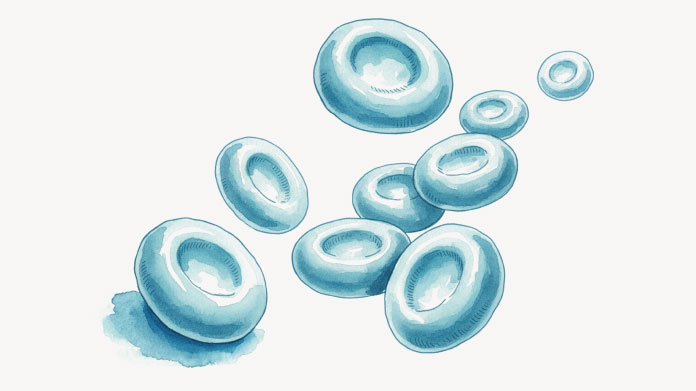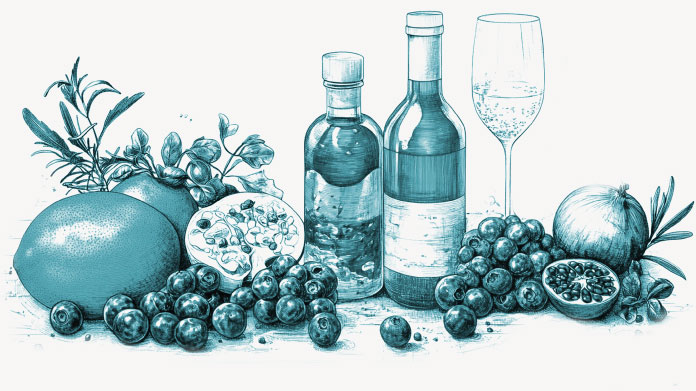Everything you need to know about vitamin E, tocotrienols and tocopherols!
Getting plenty of vitamin E? Of course you are! But, wait a minute. This vitamin is more complex than it seems. What exactly does it do? Which form should you take? What is the difference between tocopherols and tocotrienols?

What does vitamin E do?
Vitamin E - like all vitamins - plays an essential role in the body. Stored in adipose tissue, it has significant antioxidant properties and is a highly-effective free radical scavenger. It protects the body’s cells from harmful oxidative stress and degeneration, thus fighting the effects of ageing. It is also involved in many metabolic processes (neuromuscular, for example) as well as in regulating cell growth.
What are the benefits of vitamin E?
As a result of the very many studies conducted on vitamin E, we now know that it protects against cardiovascular disease by preventing the formation of blood clots and reducing levels of ‘bad’ LDL-cholesterol. It may thus lower the risk of heart attack and stroke. Other studies have demonstrated vitamin E’s benefits in preventing certain forms of cancer (such as prostate cancer in smokers), and infectious diseases (via the immune system). Last but not least, a study published in the report of the American Psychiatric Association suggests vitamin E has a mildly preventive effect in early Alzheimer’s disease.
Which foods contain vitamin E?
Vitamin E is readily available from the diet – vegetable oils such as sunflower, rapeseed and olive oil are all good sources. It is also present at beneficial levels in nuts such as almonds and hazelnuts and in dark green leafy vegetables, particularly cabbage. What is important in ensuring a good intake that meets your daily requirements (12mg/day for adults) is to eat a variety of foods rich in vitamin E. By way of example, one tablespoon of sunflower oil (approx. 15ml) provides 6mg of vitamin E, and the same quantity of wheat germ oil provides 21mg.
What are the consequences of a lack of vitamin E?
Relatively rare in humans, vitamin E deficiency is generally only seen in people with gastrointestinal malabsorption diseases (for example, Crohn’s disease). That doesn’t mean, however, that everyone else is consuming enough vitamin E to meet their needs. A study conducted in the US and Canada, published in the Journal of the Academy of Nutrition and Dietetics, showed that the vitamin E requirements of Americans were not being totally met by their diet. Deficiencies can manifest as muscular and neurological problems.
Tocotrienols and tocopherols: what’s the difference?
The term ‘vitamin E’ actually covers eight different compounds: four tocopherols (alpha-, beta-, gamma- and delta-tocopherol) and four tocotrienols (alpha-, beta-, gamma-, and delta-tocotrienol). Tocotrienols are distinguished by their three double bonds. With a greater number of unsaturated bonds, they penetrate more easily to the heart of the body’s cells. These double bonds also increase the molecules’ antioxidant capacity.
Tocotrienols and tocopherols: which should you choose?
Of all the forms of vitamin E, alpha-tocopherol is the most abundant in the body. However, in order to fully benefit from the vitamin, we need to ingest all its different compounds. Though tocotrienols are less well-known than tocopherols, research suggests their properties may be highly beneficial for our health. An American study from 1995 showed that tocotrienols may reduce the risk of atherosclerotic blockage in the carotid artery. According to several studies conducted in the 1990s, they may also be able to control and reduce cholesterol produced by the liver, a property not shared by tocopherols. The problem is that tocotrienols are much rarer than tocopherols and are therefore less available in supplement form.
What’s the difference between natural and synthetic forms?
Vitamin E is available in two forms – natural (as provided by the diet and by supplements) or synthetic (provided by supplements only). The natural form is better absorbed by the body – its bioavailability is up to twice that of its synthetic counterpart. You’d need to take 1.5-2 times more synthetic vitamin E to obtain the same effects. Note too that most of the vitamin E in capsule form – whether natural or synthetic – consists primarily of tocopherols, particularly alpha-tocopherol. It’s therefore well worth reading the labels of vitamin E supplements carefully to establish the exact composition. Ideally, they should contain all eight compounds, or at least all four tocopherols. Another point worth noting is that vitamin E acts synergistically with other antioxidants and it is therefore beneficial to combine it with vitamin C.
Keywords
15 Hours
very good expereince
very good expereince
Jelena Đaković
16 Hours
Very good products.
Very good products.
Agnes BENDSAK
2 Days
Just OK
Just OK, ordering from company for many years and being safisfied
Lynn Mae
3 Days
Recomendo
Produtos encomendados são recebidos atempadamente e de acordo com o anunciado! Muito satisfeita!
Carla Sofia
3 Days
Everything is great!
Everything is great!
Jonas
8 Days
The delivery was fast and the product…
The delivery was fast and the product is great
SOMMARIVA Gianni
10 Days
Great service and lots of information
Great service and lots of information
Gabi
13 Days
Service Satisfaction
I’m satisfied with the service; it fulfilled what it set out to do.
Anfhony Abreu
15 Days
Original product and fast delivery
Original product and fast delivery. I haven't started it yet, but will do soon.
Vincenza Catania
18 Days
Good quality
Good quality. Good service.
Leonel Guzman
20 Days
Top!!!!!!!!
Top!!!!!!!!
Michael
22 Days
Excellent!
Products are great and delivered fast!
PARDINI Debora
23 Days
From order to receive the product
From order to receive the product, the process is smooth & fast. It’s good to customers.
WONG Mei Ling
24 Days
Fast delivery
very quick delivery to italy. product is good.
Customer
25 Days
Prompt delivry !!👍
Prompt delivry !!👍
SWEET Christine
of experience
your money back
##montant## purchase





Jonson M.
13/11/2020
thankes for great informatin but the most important to Know there are many Signs of vitamin E deficiency such as : Muscle weakness Walking difficulty Numbness and tingling in arms Vitamin E is needed for night vision Vitamin E for muscle cramps Vitamin E immune system Vitamin E for dry skin and hair loss Vitamin E for wounds You have a weak digestive system Ability to dissolve a fresh clot